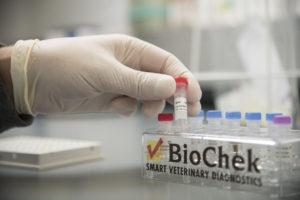BioChek provides diagnistics PCR tests for swine and poultry, as well as a range of PCR accessories such as standards.
- Click here for all PCR poultry tests
- Click here for all PCR swine tests
- Click here for more information on ELISA
Read more about our PCR test kits below.
PCR:
- With PCR you are making copies of a specific DNA sequence
- With enough copies you can perform measurements
- PCR is very sensitive
- Proper laboratory technique is important
- Running the PCR on the thermocycler
- Be aware of contamination risks
BioChek PCR in a nutshell:
- Creating a work list/plate lay-out
- Preparation of reaction mix
- DNA/RNA extraction
- Adding DNA/RNA to the reaction mix
- Running the PCR on the thermocycler
- Analysing the results, creating reports
Reagents needed to perform a PCR reaction
- Nucleotides, included in the mastermix
- DNA polymerase (taq), included in the mastermix
- Buffer, included in the mastermix
- Magnesium, included in the mastermix
- Primers, included in the primer/probe/IC mix
- Probes/beacons, included in the primer/probe/IC mix
- Internal control, included in the primer/probe/IC mix
 PCR or ELISA?
PCR or ELISA?
- PCR is capable of early detection
- Pathogen quantification possible with PCR
- PCR is less likely to cross react
- PCR detects the pathogen directly (ag instead of ab)
- Using both ELISA and PCR alternately can be benificial
BioChek PCR kit design
- Primers and probe are specific for a unique sequence
- Targeted DNA sequence determines primer/probe properties
- All BioChek PCR kits can be used simultaneously
- DNA/RNA targets can also be combined
- All targets can be quantified using standards
PCR trouble shooting
- Inhibited samples:
- Repeat sample diluted (5-10 x). Be aware: sensitivity will be decreased
- Extract DNA using a different method
- Possible contamination , negative controls positive:
- Clean work surfaces with a nucleic acid degrading solution
- Clean equipment with a nucleic acid degrading solution
- Repeat test
- Still positive NC controls:
- Perform wipe tests of work surfaces and equipment
- Wipe tests will detect DNA traces and amplicons
- Don’t report results while you suspect a contamination, resume reporting after you have found and solved the problem





